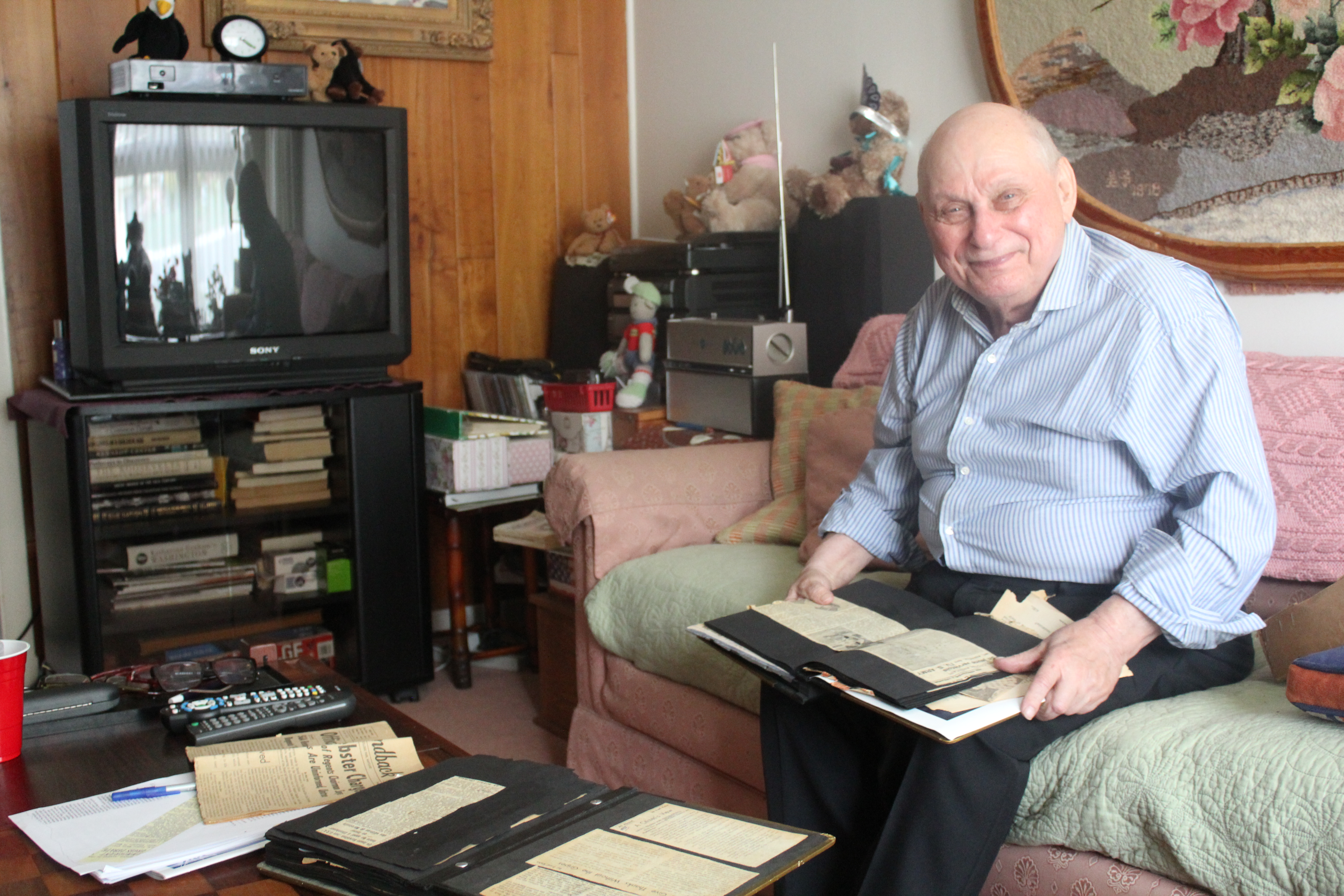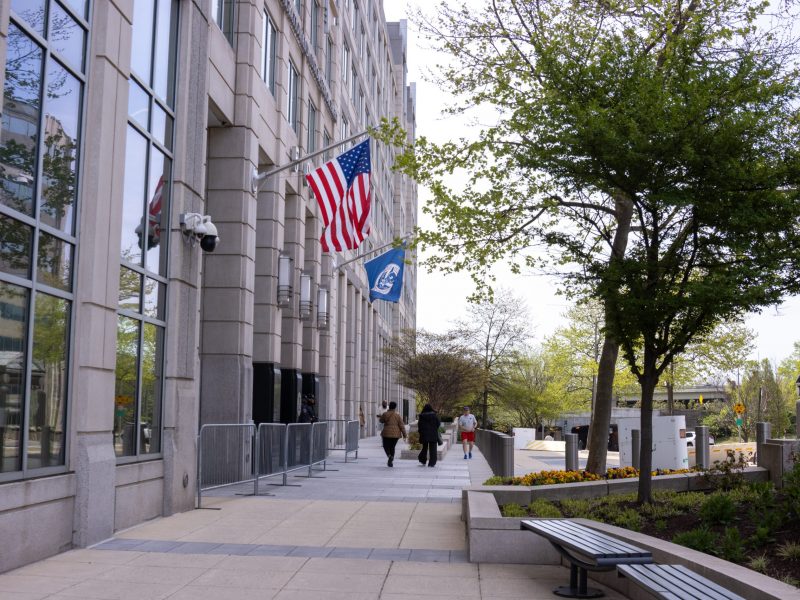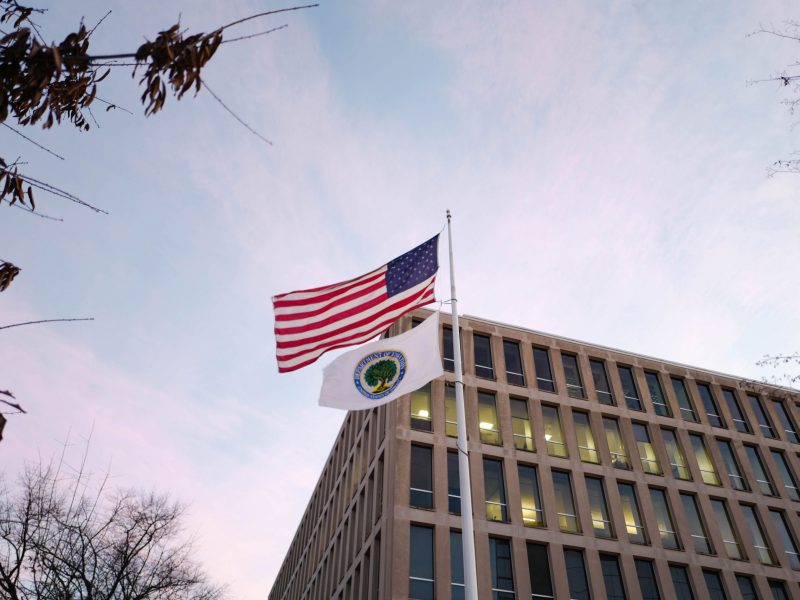By Adam Zielonka
For The Diamondback
Fred Kahn, the Maryland alumnus who pioneered the idea of televised debates between presidential candidates, is excited for his interview. He stands in the front entrance of his Bethesda home, prepared with two scrapbooks and copies of certificates, newspaper clippings and photographs documenting his days as a student.
Kahn, 83, explains each memory in detail. When asked a question, he’s prone to go on a tangent. He’s a talker, perhaps because he has important stories to tell.
He fled Nazis in his native Germany at 5 years old and grew up in Belgium. The United States drafted him into the Korean War before he was officially an American citizen. And his desire to increase civic involvement among his classmates left a lasting impact on American politics.
“If somebody would tell me my story,” Kahn said, “I wouldn’t believe it.”
This election cycle’s first debate between Hillary Clinton and Donald Trump will be held on Monday at Hofstra University in Hempstead, New York. The date also marks the 56th anniversary of the first-ever presidential debate between John F. Kennedy and Richard Nixon in 1960 — an event that only took place because Kahn got the right person to listen to his idea. In 1959, Adlai Stevenson wrote, “I would like to propose that we transform our circus-atmosphere presidential campaign into a great debate conducted in full view of all the people,” according to the New Yorker. Stevenson was the Democratic candidate for president in 1952 and 1956, and he lost twice to Dwight D. Eisenhower.
The New Yorker never credited Kahn, but it was his attempt to bring those candidates to the University of Maryland 60 Septembers ago that inspired Stevenson to write such a proposal and nudge the nation into the era of debates.
Candidates in Cole Field House
Kahn says the idea came to him while discussing the 1956 election at a summer conference at Cornell University. In August, he went to New York City and proposed the idea to six newspaper. The Associated Press picked up his story.
Kahn also wrote letters to former university President Wilson Elkins, then-Maryland Gov. Theodore McKeldin and former First Lady Eleanor Roosevelt. Roosevelt forwarded the proposal to Stevenson’s campaign manager and wrote that a debate “might be something that would arouse the interest of young people all over the country.”
With the clout he had as vice president of the International Club and columnist for The Diamondback, Kahn presented the specifics of his plan to the Student Government Association.
Fill Cole Field House with students, he proposed, and have them ask Eisenhower and Stevenson their questions, with television networks filming the action.
The SGA Culture Committee unanimously chose to send official invitations to both men.
But the Board of Regents, which sets university system policy, stepped in that October and ordered a retraction of the invitations, citing a university rule that outlawed partisan political speech on the campus.
The ruling dampened neither the idea’s momentum nor Kahn’s ambition. In 1958, the student who once hid from Nazis in Belgium returned to that country as a guide at the Brussels World Fair. While there, he met Stevenson in-person and learned that he also favored Kahn’s debate idea.
“He kept his promise,” Kahn said about Stevenson. “He pushed it.”
Debates then and now
Because the first presidential debate is said to have affected the outcome of the 1960 election between Nixon and Kennedy, Kahn’s activism may well have changed the course of history.
Irwin Morris, chairman of the government and politics department, said although many things could be considered the “deciding factor” in that election, “most research suggests the debates, particularly the first debate, was beneficial for Kennedy.”
Americans who listened to the event on the radio widely considered the result a draw. Those who watched on television, however, were far more likely to say Kennedy won. They saw Nixon — sweaty and sickly without makeup because he was recovering from a hospital visit for an infected knee — juxtaposed with a younger, well-dressed Kennedy.
“The visual component was important,” Morris said.
Kahn prefers the focus of debates to stay on the issues. He spent most of his career as a political economist for the Labor Department, where he wrote position papers on issues regarding guest workers and national ID cards. But substance often takes a backseat to sound bites and divisiveness in modern, primetime affairs.
“The thing I’m against is name-calling,” Kahn said about this year’s election.
He suggested that if one of the candidates engages in this on the debate stage, the other should say “Here you go again” — citing Ronald Reagan, who said “There you go again” in an effort to rebut Jimmy Carter in a 1980 debate — and move the focus back to the issues at hand.
‘Do not take democracy for granted’
As a Jew growing up in World War II Europe, Kahn learned early on that survival is never guaranteed.
“Every single day is a blessing,” he said. “I could have been killed if I’d remained in Germany.”
In 1938, Kahn was living with family in Germany while his parents had already moved to Belgium. European powers agreed to let Nazi Germany annex part of Czechoslovakia through the Munich Agreement. This worried Kahn’s father so much that he arranged for his 5-year-old son to leave for Belgium the next day.
So Kahn “made the most of every day” growing up, even during periods when his family was forced to hide.
“Do not take democracy for granted,” Kahn said.
Maryland U.S. Rep. Chris Van Hollen did the same before Congress in 2014. For Kahn, the “what” of his legacy is more important than the “who.” Despite the presence of moderators (which were not part of his plan), name-calling and divisiveness, Kahn remains passionate about his brainchild.
“The televised presidential debates give the students a view of what is at stake by hopefully learning about the position of the presidential contenders on their views on the future of the country,” he said. “That is, the national interest of the country.”



